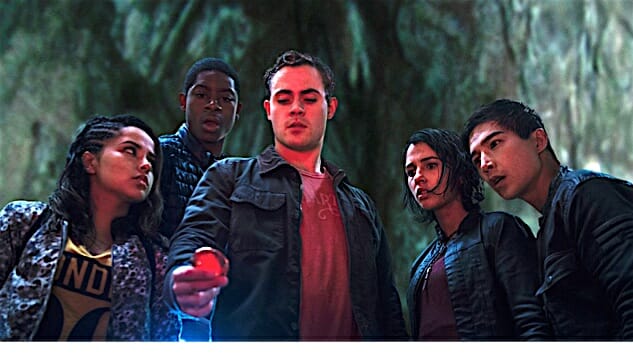Power Rangers

It happened accidentally: My friends and I were playing in an old bone-crushing, hobo-vanquishing abandoned glass mine outside of our town, when we found a set of coins which gave us the powers to protect life on Earth. To range, as it were, with power. There were six of us, yes. We were all students at Generic California Teen High.
Each of us had our own backstory, and something to prove. As I stood with the rest of the gang, I remember looking at each of them, thinking how perfectly balanced, photogenic and audience-pleasing each of us were. For some reason, I felt everything around and within us had a $105 million price tag on it. And yet all of this felt strangely familiar, as if we had been … relaunched … into our lives. Had we lived these lives, in some sense, before?
Well. I’m speaking too freely here. The other five got the powers, and the colors, the fetish skinsuits, the giant ro-beasts, the whole works.
My coin, on the other hand, glowed with the light of a laptop screen, and did absolutely nothing. No super-strength or jumping powers.
As the other Power Rangers trained for murderous battle with CGI rock creatures, I gaped at my magic mystery token with what seemed to be the appropriate level of awe. Eventually it occurred to me to ask the appropriate question:
“Why doesn’t my coin give me magical powers? Where’s my morphing ability? Why are these rhetorical questions appropriate in a movie review?”
The tiny, indefensible movie robot, Alpha 5 (voiced by Bill Hader) shrilled back to me with a carefully audience-tested “Aye-yi-yi,” its trademark phrase from its TV show incarnation. It waved its cold, soulless arms in what was supposed to be a comically charming vaudevillian dance of befuddlement, but really came across as a ghastly aping of the human condition.
Then it replied: “Oh, you’re not a fighting Power Ranger!”
“I’m not?” I said in a very adult wail.
“No,” the meatless creature hissed, “These other guys are the normal Power Rangers: rock-dull Red Ranger, ingénue Pink Ranger, hapless nerd Blue Ranger, icy-and-troubled Yellow Ranger, and completely insane and acting-class-needing Black Ranger. You are the Cynic Ranger; your power is to judge everything skeptically.”
“Really? Do I get a vehicle of my own?”
-

-

-

-

-

-

-

-

-

-

-

-

-

-

-

-

-

-

-

-

-

-

-

-

-

-

-

-

-

-

-

-

-

-

-

-

-

-

-

-








































